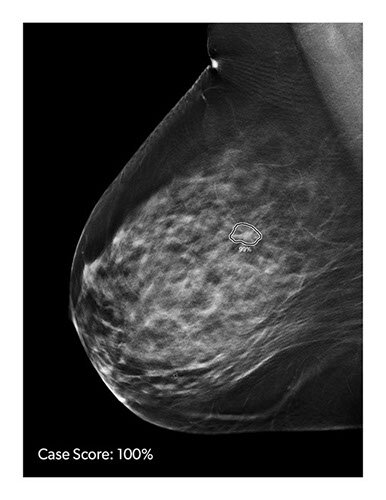AI Technology for Detecting Breast Cancer Receives CE Mark Approval
|
By MedImaging International staff writers Posted on 17 Jul 2019 |

Image: ProFound AI for 2D Mammography analyzes each mammography image and provides insight into each individual case (Photo courtesy of iCAD).
iCAD, Inc. (Nashua, NH, USA), a provider of cancer detection and therapy solutions, has received CE Mark approval for its artificial intelligence (AI) technology and workflow solution, ProFound AI for 2D Mammography. The technology is the latest addition to iCAD’s deep-learning ProFound AI platform, joining ProFound AI for Digital Breast Tomosynthesis (DBT), which was CE Marked in March 2018, FDA-cleared in December 2018, and Health Canada licensed in July 2018. The technology has been developed to support the detection of breast cancer through the identification of soft tissue densities and calcifications.
ProFound AI for 2D Mammography is a high-functioning, deep-learning algorithm that analyzes each mammography image and provides critical insight into each individual case, such as highlighting the most suspicious areas and assigning unique Certainty of Finding and Case Scores, which can assist radiologists in making clinical decisions and prioritizing caseloads. The ProFound AI platform is built upon the latest in deep-learning AI and allows for continuously improved performance via ongoing software updates.
“Europe contains 9% of the world’s population but has more than 23% of the global cancer burden, with breast cancer being the most common cancer among European women,” said Stacey Stevens, President of iCAD. “This CE Mark further validates our ProFound AI platform as a world-class artificial intelligence solution that offers benefits to both radiologists and screening-aged women in detecting breast cancer. iCAD is committed to improving patient care worldwide and we are pleased to offer this powerful technology to a growing number of hospitals, imaging centers and women across Europe.”
“ProFound AI for 2D Mammography has the potential to assist radiologists in their interpretation of 2D mammography images, as we have seen with ProFound AI for DBT,” said Axel Gräwingholt, MD, Radiologie am Theater, in Paderborn, Germany. “As breast cancer rates continue to rise, it is imperative for radiologists to find cancers sooner, when they may be more easily treated, with fewer callbacks and false positives, which can be inconvenient and stressful for patients.”
ProFound AI for 2D Mammography is a high-functioning, deep-learning algorithm that analyzes each mammography image and provides critical insight into each individual case, such as highlighting the most suspicious areas and assigning unique Certainty of Finding and Case Scores, which can assist radiologists in making clinical decisions and prioritizing caseloads. The ProFound AI platform is built upon the latest in deep-learning AI and allows for continuously improved performance via ongoing software updates.
“Europe contains 9% of the world’s population but has more than 23% of the global cancer burden, with breast cancer being the most common cancer among European women,” said Stacey Stevens, President of iCAD. “This CE Mark further validates our ProFound AI platform as a world-class artificial intelligence solution that offers benefits to both radiologists and screening-aged women in detecting breast cancer. iCAD is committed to improving patient care worldwide and we are pleased to offer this powerful technology to a growing number of hospitals, imaging centers and women across Europe.”
“ProFound AI for 2D Mammography has the potential to assist radiologists in their interpretation of 2D mammography images, as we have seen with ProFound AI for DBT,” said Axel Gräwingholt, MD, Radiologie am Theater, in Paderborn, Germany. “As breast cancer rates continue to rise, it is imperative for radiologists to find cancers sooner, when they may be more easily treated, with fewer callbacks and false positives, which can be inconvenient and stressful for patients.”
Latest Imaging IT News
- New Google Cloud Medical Imaging Suite Makes Imaging Healthcare Data More Accessible
- Global AI in Medical Diagnostics Market to Be Driven by Demand for Image Recognition in Radiology
- AI-Based Mammography Triage Software Helps Dramatically Improve Interpretation Process
- Artificial Intelligence (AI) Program Accurately Predicts Lung Cancer Risk from CT Images
- Image Management Platform Streamlines Treatment Plans
- AI-Based Technology for Ultrasound Image Analysis Receives FDA Approval
- Digital Pathology Software Improves Workflow Efficiency
- Patient-Centric Portal Facilitates Direct Imaging Access
- New Workstation Supports Customer-Driven Imaging Workflow
Channels
Radiography
view channel
Novel Breast Imaging System Proves As Effective As Mammography
Breast cancer remains the most frequently diagnosed cancer among women. It is projected that one in eight women will be diagnosed with breast cancer during her lifetime, and one in 42 women who turn 50... Read more
AI Assistance Improves Breast-Cancer Screening by Reducing False Positives
Radiologists typically detect one case of cancer for every 200 mammograms reviewed. However, these evaluations often result in false positives, leading to unnecessary patient recalls for additional testing,... Read moreMRI
view channel
PET/MRI Improves Diagnostic Accuracy for Prostate Cancer Patients
The Prostate Imaging Reporting and Data System (PI-RADS) is a five-point scale to assess potential prostate cancer in MR images. PI-RADS category 3 which offers an unclear suggestion of clinically significant... Read more
Next Generation MR-Guided Focused Ultrasound Ushers In Future of Incisionless Neurosurgery
Essential tremor, often called familial, idiopathic, or benign tremor, leads to uncontrollable shaking that significantly affects a person’s life. When traditional medications do not alleviate symptoms,... Read more
Two-Part MRI Scan Detects Prostate Cancer More Quickly without Compromising Diagnostic Quality
Prostate cancer ranks as the most prevalent cancer among men. Over the last decade, the introduction of MRI scans has significantly transformed the diagnosis process, marking the most substantial advancement... Read moreUltrasound
view channel
Deep Learning Advances Super-Resolution Ultrasound Imaging
Ultrasound localization microscopy (ULM) is an advanced imaging technique that offers high-resolution visualization of microvascular structures. It employs microbubbles, FDA-approved contrast agents, injected... Read more
Novel Ultrasound-Launched Targeted Nanoparticle Eliminates Biofilm and Bacterial Infection
Biofilms, formed by bacteria aggregating into dense communities for protection against harsh environmental conditions, are a significant contributor to various infectious diseases. Biofilms frequently... Read moreNuclear Medicine
view channel
New SPECT/CT Technique Could Change Imaging Practices and Increase Patient Access
The development of lead-212 (212Pb)-PSMA–based targeted alpha therapy (TAT) is garnering significant interest in treating patients with metastatic castration-resistant prostate cancer. The imaging of 212Pb,... Read moreNew Radiotheranostic System Detects and Treats Ovarian Cancer Noninvasively
Ovarian cancer is the most lethal gynecological cancer, with less than a 30% five-year survival rate for those diagnosed in late stages. Despite surgery and platinum-based chemotherapy being the standard... Read more
AI System Automatically and Reliably Detects Cardiac Amyloidosis Using Scintigraphy Imaging
Cardiac amyloidosis, a condition characterized by the buildup of abnormal protein deposits (amyloids) in the heart muscle, severely affects heart function and can lead to heart failure or death without... Read moreGeneral/Advanced Imaging
view channel
New AI Method Captures Uncertainty in Medical Images
In the field of biomedicine, segmentation is the process of annotating pixels from an important structure in medical images, such as organs or cells. Artificial Intelligence (AI) models are utilized to... Read more.jpg)
CT Coronary Angiography Reduces Need for Invasive Tests to Diagnose Coronary Artery Disease
Coronary artery disease (CAD), one of the leading causes of death worldwide, involves the narrowing of coronary arteries due to atherosclerosis, resulting in insufficient blood flow to the heart muscle.... Read more
Novel Blood Test Could Reduce Need for PET Imaging of Patients with Alzheimer’s
Alzheimer's disease (AD), a condition marked by cognitive decline and the presence of beta-amyloid (Aβ) plaques and neurofibrillary tangles in the brain, poses diagnostic challenges. Amyloid positron emission... Read more.jpg)
CT-Based Deep Learning Algorithm Accurately Differentiates Benign From Malignant Vertebral Fractures
The rise in the aging population is expected to result in a corresponding increase in the prevalence of vertebral fractures which can cause back pain or neurologic compromise, leading to impaired function... Read moreIndustry News
view channel
Bayer and Google Partner on New AI Product for Radiologists
Medical imaging data comprises around 90% of all healthcare data, and it is a highly complex and rich clinical data modality and serves as a vital tool for diagnosing patients. Each year, billions of medical... Read more


















